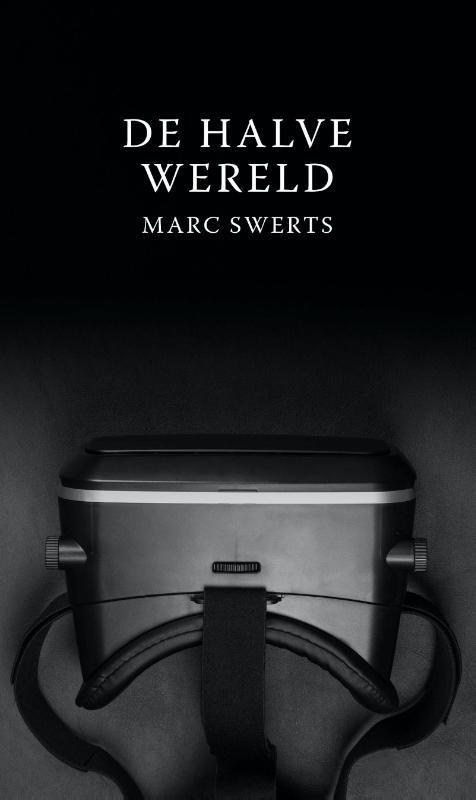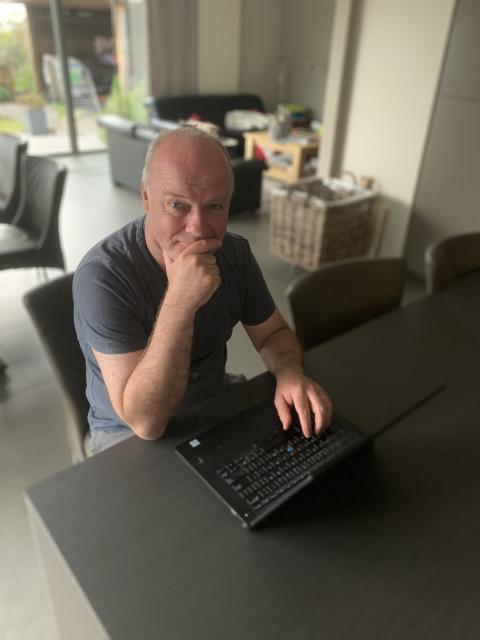“I’m too lazy to be famous”
Not only is Marc Swerts a professor at Tilburg University, but he is also a writer and saxophonist. His third book came out last spring. Once again, events at the fictional ‘University of Brabant’ provide the subject matter. “It’s fun to write about smart people doing dumb things.”
The title of your third book is De halve wereld (‘Half the world’). What is it about?
“It’s about the pursuit of innovation. As in my previous books, De halve wereld is set at a university in Brabant. A Dutch American arrives at the university and thinks that things should be done differently. A Belgian, who has already encountered some difficulties with the Dutch in my previous books, thinks otherwise. His irritation only increases in relation to the American. The Belgian is somewhat more traditional and doesn’t see the point of framing everything in terms of innovation. Both the American and the Belgian have ‘healthy’ egos. Predictably, this results in a clash. My first book, Dekker – een campusroman (‘Dekker – a campus novel’), was about the university prize-chasing circus. The second, Nach Schwitzerland (‘To Switzerland’), was about escapism.”
Why do you enjoy writing about the academic world so much?
“The university is my biotope. It’s a world in which narcissism plays a big role. For example, it is considered important to have your name referred to in many publications. When you contribute to a publication, you need to ensure your name gets a prominent mention in the list of authors. You don’t find this kind of thing in the world of mass production and consumption. You only see ‘Philips’ written on the appliance, not the name of the person who actually designed it. If publications remained anonymous, I doubt whether so much would be published as is presently the case. All that narcissism results in comical situations. It’s fun to write about smart people doing dumb things. In that sense, there’s a similarity to reality TV. It’s good for viewers to understand that famous people use the bathroom just like everyone else. Would a reality TV show about university life be interesting? You bet!
I started writing fiction when an acquaintance of mine suggested I try it. Initially I was unsure whether to go with a philosophical novel or a psychological drama. I feel this satirical form suits me best, and I hope that it also appeals to an audience outside universities.”

Do you find writing cathartic?
“Sure! In academia, it’s only possible to express your creativity within a strict framework. You can’t lie and you have to stick to the rules that have been laid down. It works the other way around in fiction. You can do whatever you want, and are even assumed to be lying. It was actually my intention to keep it to a trilogy, but a research proposal I was working on last summer brought on such a strong bout of intellectual exhaustion that I compensated by starting on another story. By using humor in my stories, I try to reduce the focus on the more tedious aspects of academic life. If you can laugh about things, they become more palatable. And seeing as, in this way, writing serves a purpose for me, I make time for it. In the same way that other people make time for music, vacations or sport. No, I don’t feel any pressure while writing. I think that you generally feel that when having to do things that you yourself don’t see the point of, or for which you lack intrinsic motivation, or that you do simply because you have to. A lot of issues at the university could be resolved if we were to organize teaching and research so that people experienced it as a paid hobby which they could enjoy.”
Reality is sometimes worse than fiction!
Which writers have influenced you?
“I love writers who are able to create something transcendental from an everyday occurrence. Someone like Simon Carmiggelt, for example. In my books, I also describe daily life at the university. In fact, reality is sometimes worse than fiction. I recently read that a lecturer and a PhD student in Belgium had an argument in front of the class that actually turned into a fist fight. If I’d used that in my book, readers would have said that it wasn’t very realistic.”
Who do you write for?
“First and foremost, for myself. I already consider it a success if I find what I’ve written funny. Obviously, my books are read by colleagues from within the university milieu. I get an ego boost from apparently having succeeded in portraying characters who, despite the satirical form, are recognizable. I was once approached by someone who said: ‘I haven’t read the book, but I think it’s about me. I don’t think that’s fair.” He was talking about Dekker, an unsympathetic figure. Why on earth would you want to see yourself in him? In my first book, I quote a Carly Simon song: ‘You’re so vain, you probably think this song is about you.’ I think that’s a brilliant lyric. It applies to the characters in my book, but also to the people who read it.”
Are there many similarities between your academic work and your writing?

“They both involve observation. I’ve always been fascinated by human interaction. I can use a lot of things from my research in my books. For example, I have done research into who adapts to the other when a Flemish person and a Dutch person converse. And that turns out to be the Flemish person. I use this kind of information in my story. I try not to use academic terms in my fiction, except where this serves a purpose, for example in emphasizing the ivory tower aspect of academia.
I’m also a blues saxophonist, by the way. There are parallels there, too. The students are my audience. As a writer, I’m also trying to communicate something. And I aspire to be original, not only as a saxophonist, but also as a writer and academic. These three activities balance each other well.”
Academic, saxophonist, writer; perhaps you just wanted to be famous?
“Perhaps, but I’m too lazy for that, I think. To be famous, you have to constantly work on your PR. Ultimately, I want to be appreciated first and foremost for what I do, not due to the quality of my PR. In fact, famous people are often not really very interesting. Many of them work to a formula. I prefer to listen to people who actually have something to say. My life is a quest for authenticity. Do you think that Louis Paul Book ever took writing classes?”
About Marc Swerts
Marc Swerts is a professor of Communication and Information Science. He is specialized in non-verbal communication. Dekker – een campusroman was first published in 2020. This was followed up by Nach Schwitzerland in 2021. Swerts’s books are published by Beefcake Publishing.
Date of publication: 14 November 2022
